Christian Zabriskie and Lauren Comito Named Librarian(s) of the Year 2020
Christian Zabriskie and Lauren Comito have partnered to make Urban Librarians Unite a powerful grassroots organization, while serving as a model for how teamwork can get things done—earning them the shared title of LJ's 2020 Librarian of the Year.
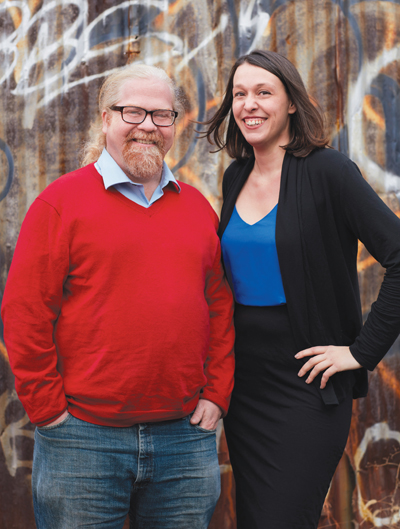 |
Photo by Matt Carr Photography |
Each year, Library Journal’s Librarian of the Year award celebrates an individual who has significantly advanced the profession and its mission. Sometimes, however, the synergy between two collaborators is striking enough that the recognition needs to include them both. Urban Librarians Unite (ULU) founders Lauren Comito and Christian Zabriskie have been colleagues, business partners, and each other’s inspiration for going on a decade. Their energetic grassroots activism has encompassed causes ranging from annual funding advocacy for the three New York City library systems to services and resources for unaccompanied minors and immigrants across the country to an inclusive, innovative conference aimed at front-line library workers.
Comito and Zabriskie have demonstrated, over and over, the possibilities for putting ideals into action. Every one of the initiatives they have launched started from a conversation, a “what if” question, or an emotional response to a systemic problem somewhere—often all three. The size of the problem doesn’t matter, the two insist. What counts is the belief that it’s possible to make a difference, the patience to take the work one step at a time, and having allies who want to help in all corners.
“Lauren and Christian’s dedication to libraries, librarians, and all those who support our institution is beyond bounds,” says Nick Buron, Chief Librarian and Senior VP of Queens Public Library (QPL), who hired Zabriskie for his first QPL position and indirectly supervised both. “For ten years, I have witnessed them spending long nights, rallying in the rain, and literally using a megaphone to scream the values and necessity of libraries and their dedicated workers.”
“When we get mad, at ULU we do things,” says Zabriskie, “because we can.” Working together, they have proved repeatedly that passion—and teamwork—can move mountains at a grassroots level, earning them the distinction of LJ’s 2020 Librarian(s) of the Year, sponsored by Baker & Taylor.
PRACTICAL PRIORITIES
Both came to librarianship by roundabout paths. Comito was an art major. After graduating, however, she wanted a bit more security than working as an artist provided, and “librarians had health insurance and a union.” Comito enrolled in the Master of Library Science program at New York City’s Queens College; while there, she took a job as a librarian trainee at QPL and moved through the ranks for the next 11 years—as a YA librarian, doing outreach for the library’s Job & Business Academy, and serving as an assistant branch manager. In 2017, Comito moved to Brooklyn Public Library (BPL), where she currently serves as Neighborhood Library Supervisor at the Leonard Library.
Zabriskie credits a “wonderful” middle school librarian and his mother’s experience on their local library board with an early interest in libraries, but his first careers were in publishing and sales. Life as a sales rep meant traveling two weeks out of every three, however, and Zabriskie, newly married and living in Florida, wanted to be home more. He earned an MLS as Florida State University (FSU) in Tallahassee, working at FSU’s Strozier Library and then as circulation supervisor at the Leroy Collins Leon County Public Library. After a three-year stint as the assistant children’s librarian at the Bermuda National Library, Zabriskie moved to New York, where he started working in YA services at QPL—in frontline and administrative positions, and then as assistant branch manager for three different locations. Zabriskie recently moved from the position he has held since 2016 as administrator of the Yonkers Public Library’s Grinton I. Will Branch to step into the role of Executive Director of Onondaga County Public Libraries in upstate New York.
The two first met at QPL’s new employee orientation, and solidified their friendship while earning their Public Library Administration certificates from Long Island University’s Palmer School of Information Science. From there, and with every new shared project, their partnership has deepened and grown. “Each step of the way, we seemed to be able to work together better,” says Zabriskie. (Appropriately, both have been named LJ Movers & Shakers: Zabriskie in 2012, Comito in 2015.)
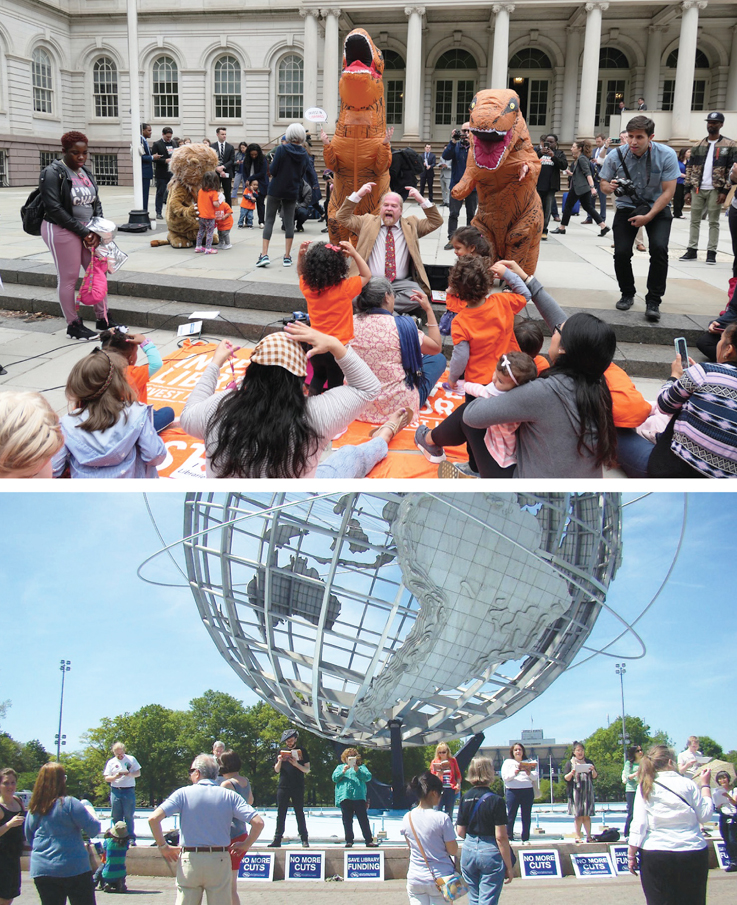 |
LOCALLY AND GLOBALLY Top: “Dinosaurs didn’t fund libraries and look what happened to them,” read signs at a 2019 Save NYC Libraries rally, where Comito (in T. rex costume, r.) backed up Zabriskie (c.) at NYC’s City Hall. Bottom: a 2012 ULU Read In at the 1964 New York World’s Fair site’s Unisphere in Queens. Top photo by Krissa Cavouras; bottom photo by Vicky Zabriskie |
RECESSION ROOTS
Zabriskie first had the idea for ULU in 2007, when he was working at QPL. After attending a meeting in Brooklyn for citywide YA librarians, he realized that while they had much in common, librarians throughout the city’s three systems—Queens, Brooklyn, and New York Public Library (NYPL)—didn’t have much opportunity to talk. “There just wasn’t really a space for those conversations to happen, except at the top echelon where people talked all the time,” says Zabriskie. “So that’s originally what ULU was, just a chance for people to meet up, have beer, have tacos.”
Then the Great Recession hit the New York City budget, and in 2010 frontline librarians felt the blow. Comito, already an ULU regular, received a 90-day layoff notice, along with many other members—not a coincidence, she notes. “Most of the people coming to the monthly get-togethers were holding pink slips because we were all the younger, newer people who were just starting.” Comito’s husband had just gotten laid off as well and they had a one and a half year old baby.
With a critical mass of ULU members’ jobs in peril, says Zabriskie, the organization did a quick pivot from networking to advocacy. Within a matter of weeks the first Save NYC Libraries campaign took shape to bring attention to the drastic library system budget cuts. It would cement Comito and Zabriskie’s working partnership over the next decade. ULU incorporated and became a nonprofit in 2012 and launched its first conference in 2013. It has since grown into a group of library professionals and advocates “working to build community centered 21st-century libraries” across the country.
SAVING NYC LIBRARIES
New York City has to allocate library funding within the mayor’s executive budget anew each year, and ULU’s Save NYC Libraries campaign has worked tirelessly to help secure city funding for all three city systems. What began as a postcard campaign evolved into an inventive series of actions that have run the gamut from street theater to sophisticated advocacy strategies—all envisioned and launched on a budget, but no less successful for their grassroots origins. “We wanted to be too loud to be ignored,” says Comito.
The first of ULU’s strategies in 2010 was the 24 Hour Read In, hosted by BPL. (“It was awesome,” says Comito. “We emailed them and they said yes, and do you need access to the bathrooms? We hadn’t thought of that yet, but—yes, we did.”)
The Read In, held annually for the next seven years, gathered librarians, children’s and adult authors, and library advocates to read around the clock in 15 minute increments. “Anybody could sign up,” says Zabriskie. One of the few rules was that no pornography was allowed during children’s story hour on Sunday mornings, but otherwise anything went. “You’d have somebody reading Proust and then you’d have somebody reading a Harlequin, or a biography of Justin Bieber.” People would come, read, leave, and sometimes return in the morning with coffee for everyone; one couple stayed until 1 a.m., went home and changed into pajamas, and came back for another hour. The 2016 event, held at NYPL’s Schwarzman Building on 42nd Street, took place during a citywide storm warning that advised residents to stay home. Still, between 300 and 400 readers showed up, including the 16 authors who had committed their time.
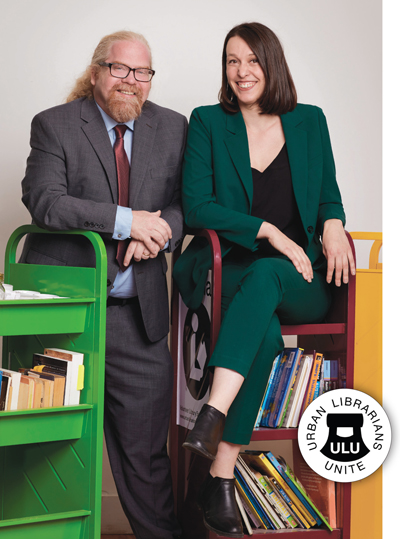 |
Photo by Matt Carr Photography |
The Read In is analogous to the library’s around-the-clock reach, Zabriskie explains. “The idea was that at some point in those 24 hours, somebody in New York City is using a library resource. It can be a nurse working third shift, a kid up late, somebody who has insomnia, somebody who’s watching a movie or reading a book on a Kindle. Somebody is always accessing some piece of library benefit, 24 hours a day, seven days a week, 365 days a year.”
ULU’s advocacy efforts have continued to grow, ranging from the whimsical—a mass zombie shuffle over the Brooklyn Bridge to City Hall on Halloween—to the warm and fuzzy, with a flashmob mass hug of the Schwarzman Building organized in 2011. In 2012, a book seeding campaign distributed some 1,500 books to the public bearing stickers that read, “Libraries in NYC are facing a 32% budget cut. When libraries close this could be your only access to free books.” Each sticker had a QR code and URL for a website where people could sign petitions in support of library funding.
In past years, says Comito, ULU’s funding advocacy work has been more about supporting the libraries’ campaigns than making its own loud noise. “There’s a great deal of mutual respect now,” says Zabriskie. “That’s a big thing for a small organization, that three of the largest and most innovative public libraries in the country have fostered us. Which doesn’t mean that we haven’t disagreed with them on occasion, and let them know about it. But that’s part of the relationship too.”
That trust, notes Comito, “is about always showing up.” And ULU has continued to show up, calling in regularly to the “Ask the Mayor” segment on Brian Lehrer’s WNYC radio show, and developing a database of elected officials that lists their causes, interests, committees, and past experience—as well as photos, so advocates can pick them out of a crowd and start a conversation connecting the issues they care about to the work libraries do.
Comito and Zabriskie have spoken and written extensively on their advocacy strategies, ranging from ways to better work with organizations such as the American Library Association (ALA) to Zabriskie’s most grassroots advice: “If you go on a date with someone, make them contact their congressperson before you have dinner.”
HELP WHERE IT’S NEEDED
After Hurricane Sandy devastated the New York area in fall 2012, ULU put out a call for donations of children’s books to help replace damaged library collections and distribute to children and families in storm-impacted areas. By January 2013 the campaign had received more than 20,000 books from institutions and individuals across the country. ULU placed mini libraries in front of branches that were closed after the storm in the Queens neighborhoods of Broad Channel and Seaside and BPL locations in Red Hook, Coney Island, and Gerritsen Beach. The bright orange, all-weather mini libraries, purchased with a micro-grant, held about 100 books each; the shelves inside were made from old corrugated plastic budget advocacy signs from NYLA, cut to fit and laminated three at a time, notes Comito. Zabriskie recalls loading up each mini library, waiting in his car for a few minutes until the crowd around it dispersed, and filling it back up again.
ULU’s reach extends beyond New York, however. Libraries Serve Refugees (LSR) grew out of conversations among a group of ALA council members about the Trump administration’s immigration policies. When Iraqi refugees were detained at New York’s JFK Airport in January 2017, Comito and Zabriskie realized it was time to act. They put out a call for volunteers across the United States to compile state- and nationwide at-a-glance resources, government resources, and toolkits, as well as a wealth of relevant articles; interest was so great that they had to cap enrollment at 150 within the project’s first two weeks.
Using Slack and the collaboration platform Airtable to coordinate volunteers, LSR broke the work down by geographically dispersed teams: researchers, tasked with uncovering and verifying resources in particular subject areas; editors, who write content and clean up the copy; a metadata team to tag and index the sources; and the web administration team, which publishes the work on the website (refugeelibraries.org). Most of the resources were free, and any additional costs for web hosting and communications was funded through ULU general donations.
The growing initiative brings together information to help libraries that serve refugees, as well as other organizations that work with these populations. The more than 120 resources provided include recommendations for serving refugees and migrants with disabilities; addressing post-traumatic stress disorder (PTSD); bridging youth and children’s services; providing employment assistance; interacting with police, ICE, and other government agencies; and supporting refugees’ cultural orientation.
BOOKS FOR KIDS
After getting involved with LSR, says Zabriskie, “I look at these kids and I’m reminded of my own child. It bothers me a lot that that’s happening.”
So with the rallying cry, “Every child has a right to storytime,” ULU launched the Unaccompanied Minors Book Drive, partnering with a children’s services agency in Yonkers that houses and helps unaccompanied minors. They set up an Amazon wish list and a PayPal drive for book donations, noting on the website, “We believe that when times are tough you go with what you know. We know the joy and comfort that books can offer. You can do your part to give them some of that comfort.” With the support of Yonkers Public Library, ULU has been able to offer some programming for the children, issued them library cards, and brought in a teen collection in Spanish and other languages.
“And then we decided to scale up,” adds Zabriskie. “Because that’s what we do.” Zabriskie and Comito have worked with REFORMA’s (the National Association to Promote Library & Information Services to Latinos and the Spanish Speaking) Children in Crisis Task Force for years. ULU and the task force together applied for—and won—more than $95,000 in book credits from the nonprofit social organization First Book’s OMG Books Awards, which will provide books to be distributed to migrant children in foster care and secure facilities across four states, as well as attorney’s offices, support agencies, and directly to children.
The biggest challenge? Choice—it’s a huge amount of money to spend on discounted children’s books, says Comito. At press time over 12,000 books had gone directly into the hands of children, with thousands more in progress. In 2019, ULU also set up a crowdfunded drive to help purchase games, puzzles, art supplies, sports equipment, and personal hygiene supplies, that netted nearly $1,700.
“THE CONFERENCE WE WANT TO ATTEND”
ULU’s conference is as different as its approach to advocacy. The day-long Urban Librarians Conference, which ULU has held at BPL every year since 2013, costs $35 and is capped at 225 attendees. “The conference is designed so that librarians who work a reference desk get professional opportunities that they might not otherwise be able to have,” says Comito. “Not everyone can make it to a large state or national conference, and they have great things to say and they’ve done amazing work. Our job at ULU, as I see it, is to make it so that that’s possible.”
It helps ULU create and maintain a network of support for library workers, connecting back to the organization’s very first purpose: to allow frontline librarians in big urban systems to connect with their peers As frontline library staff, “You don’t always get a chance to talk about what is happening,” Comito notes. “ULU’s always been a place where you could go and talk about this horrible thing that happened to you and people will say, ‘I understand, how are you doing?’ and send you an email and check up on you later.”
“Because we’ve needed it ourselves,” adds Zabriskie. “We’ve both been on the receiving ends of those emails.”
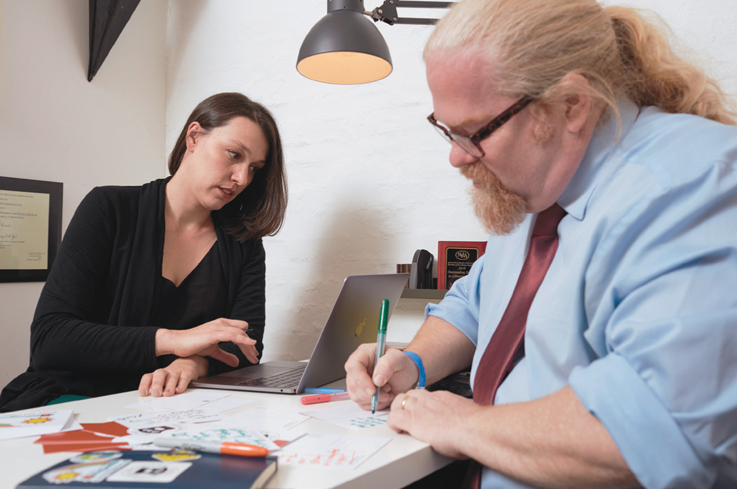 |
TEAMWORK IN ACTION Comito and Zabriskie at work in ULU’s Brooklyn office. Photo by Matt Carr Photography |
The event has explored themes relevant to the on-the-ground librarianship, such as the first, “Living in Interesting Times,” or 2017’s “Dangerous Librarianship.” Speakers have included New York City Council Deputy Leader Jimmy Van Bramer, a fierce advocate for library funding; social justice librarians Margo Gustina and Eli Guinnee, Librarian.net founder Jessamyn West, Maurice Coleman, technical trainer at Harford County Public Library, MD; and sociologist Eric Klinenberg. The three NYC library systems donate space, breakfast, program printing, and often staff.
“We basically created the conference we want to attend,” says Comito—adding, “but then neither of us really gets to attend it,” as they spend most of their time refilling coffee urns, checking people in, making sure speakers have what they need, and keeping the technology working smoothly.
The upcoming 2020 conference, “Caution: Librarians at Work!”, will focus on daily realities such as trauma in the workplace, mid-career development, diversity in the library workforce, rights and protections for staff, “badass library workers,” and philosophies of work and management.
TEAMWORK AND TRUST
There is still much advocacy on the horizon for ULU—unfortunately, the need for it never goes away, notes Comito—and more projects as needs arise. Comito and Zabriskie ach have their own causes they plan to address through their work: Zabriskie wants to bring a focus to libraries on policy changes for children’s adoptive and foster care, and Comito, diagnosed with ADHD at age seven, hopes to increase awareness of neurodiversity among library workers and look at ways to play up those strengths in the workplace.
ULU works, by all accounts, because it’s small and scrappy. Other than the ten-member board, Comito jokes, membership “expands and contracts from ten or 15 people to 200 depending on what’s happening at any given time.” While they accept payment for articles or honoraria for speaking, no one draws a salary—“except the interns,” both chime in simultaneously. The organization’s projects and administration are accomplished strictly outside of members’ work hours, and everything is done on a shoestring, thanks to tireless planning and steadfast donors.
Passion is a large part of the equation, but much of ULU’s energy derives from Comito and Zabriskie’s unswerving teamwork. “We’ve trusted each other,” says Zabriskie. “We’ve been together ten years as business partners, and we’ve tried a lot of things.” Not all of them have been successful, he notes. “We’ve had some bombs. It’s okay to have things go south on you. If you’re trying enough stuff then a percentage of it will work.” Though Zabriskie is moving away from NYC, the pair don’t expect their partnership to change much, relying on visits and videoconferencing.
Each credits the other with helping evolve their ideas of a partnership, and learning how to step out of each other’s way. As they readily point out, librarianship is all about accepting other people’s ideas and having the strength—and lack of ego—to support somebody else. The result is a partnership, and an organization, that can move nimbly from conviction to campaign without losing sight of values and whose work can serve as a model for other groups that want to effect change on any scale. Quite simply, says Buron—who has led QPL in providing support for the Urban Librarians Conference and is a sustaining ULU contributor—“They have made a difference.”
“One of the things that’s really powerful for ULU is that if we see something that’s wrong, we can just do something about it,” says Zabriskie. “Everybody works hard, everybody wants to do well, but a lot of organizations that are very powerful also have a lot of layers to them. When it’s us and the board we can be like, hey guys, quick board vote—is it cool if we now dedicate resources to finding resources for refugees? OK, great! Off to the races we go.”
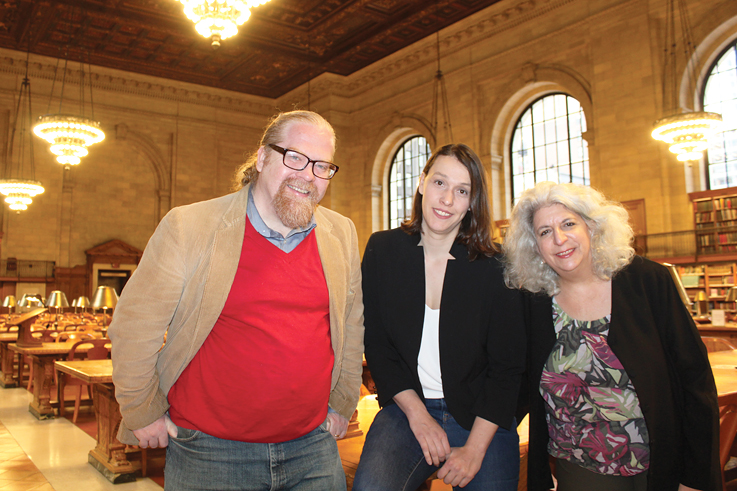 |
NATURAL HABITAT Zabriskie, Comito, and LJ News Editor Lisa Peet at NYPL's Rose Reading Room. Photo by Kevin Henegan |
RELATED
ALREADY A SUBSCRIBER? LOG IN
We are currently offering this content for free. Sign up now to activate your personal profile, where you can save articles for future viewing









Add Comment :-
Comment Policy:
Comment should not be empty !!!